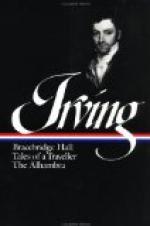“But why does not the police interfere and root them out?” said the Englishman.
“The police is too weak and the banditti are too strong,” replied the improvvisatore. “To root them out would be a more difficult task than you imagine. They are connected and identified with the people of the villages and the peasantry generally; the numerous bands have an understanding with each other, and with people of various conditions in all parts of the country. They know all that is going on; a gens d’armes cannot stir without their being aware of it. They have their spies and emissaries in every direction; they lurk about towns, villages, inns,—mingle in every crowd, pervade every place of resort. I should not be surprised,” said he, “if some one should be supervising us at this moment.”
The fair Venetian looked round fearfully and turned pale.
“One peculiarity of the Italian banditti” continued the improvvisatore, “is that they wear a kind of uniform, or rather costume, which designates their profession. This is probably done to take away from its skulking lawless character, and to give it something of a military air in the eyes of the common people; or perhaps to catch by outward dash and show the fancies of the young men of the villages. These dresses or costumes are often rich and fanciful. Some wear jackets and breeches of bright colors, richly embroidered; broad belts of cloth; or sashes of silk net; broad, high-crowned hats, decorated with feathers of variously-colored ribbands, and silk nets for the hair.
“Many of the robbers are peasants who follow ordinary occupations in the villages for a part of the year, and take to the mountains for the rest. Some only go out for a season, as it were, on a hunting expedition, and then resume the dress and habits of common life. Many of the young men of the villages take to this kind of life occasionally from a mere love of adventure, the wild wandering spirit of youth and the contagion of bad example; but it is remarked that they can never after brook a long continuance in settled life. They get fond of the unbounded freedom and rude license they enjoy; and there is something in this wild mountain life checquered by adventure and peril, that is wonderfully fascinating, independent of the gratification of cupidity by the plunder of the wealthy traveller.”
Here the improvvisatore was interrupted by a lively Neapolitan lawyer. “Your mention of the younger robbers,” said he, “puts me in mind of an adventure of a learned doctor, a friend of mine, which happened in this very neighborhood.”
A wish was of course expressed to hear the adventure of the doctor by all except the improvvisatore, who, being fond of talking and of hearing himself talk, and accustomed moreover to harangue without interruption, looked rather annoyed at being checked when in full career.
The Neapolitan, however, took no notice of his chagrin, but related The following anecdote.




